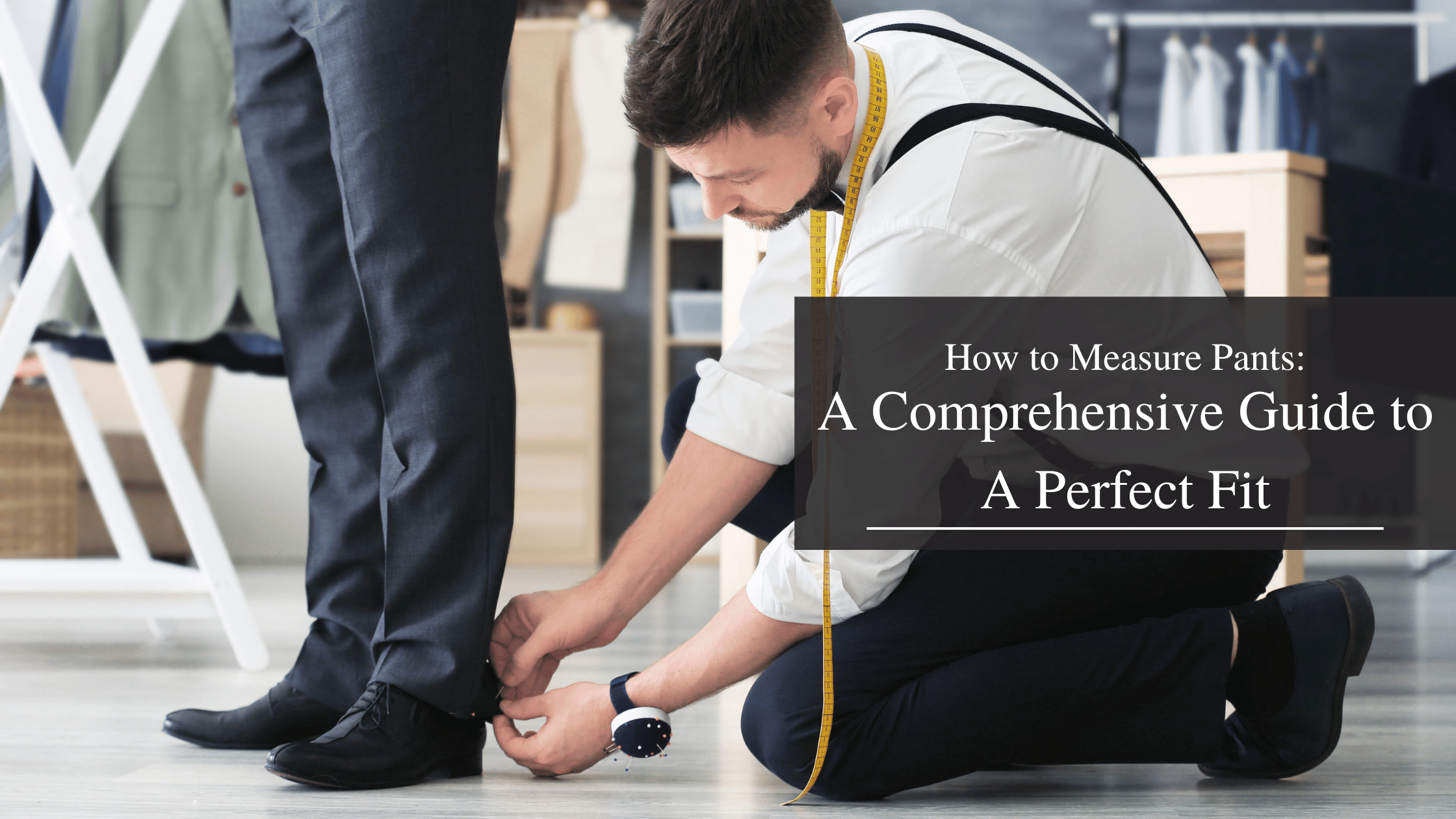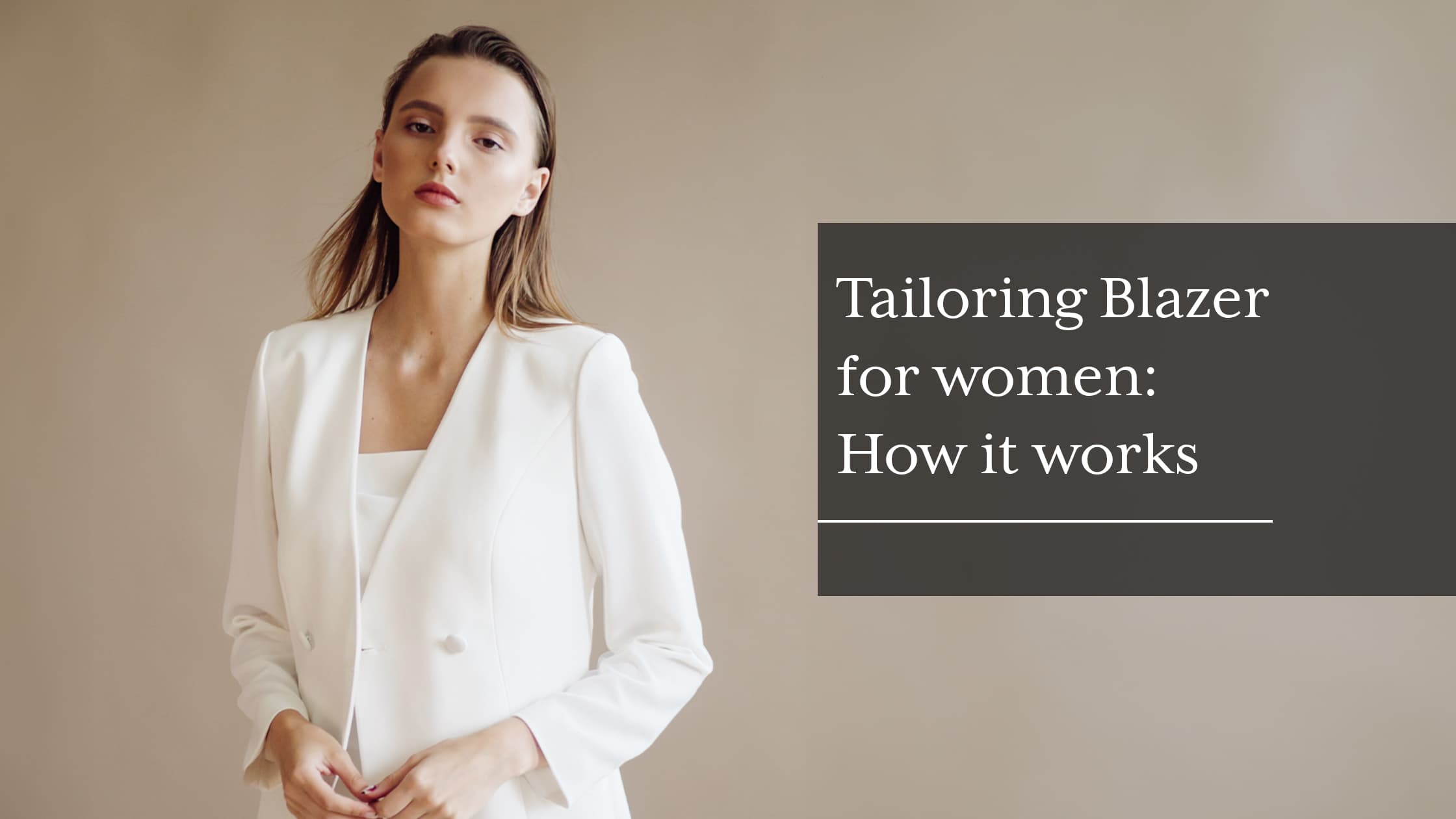
A well-tailored blazer is more than just a piece of clothing—it’s an important part of your wardrobe. The right fit can add both style and versatility to your outfits. When it comes to women’s blazers, tailoring involves careful consideration at each step, from choosing the right fabric to ensuring the details suit your body shape. In this blog, we’ll take you through the process of crafting a tailored blazer, so you can see what’s involved in creating a piece that fits you perfectly.
Fabric Selection
Choosing the right fabric for your tailored blazer is key to achieving the desired look, feel, and functionality. Each fabric—Wool, Cotton, Linen, and Synthetic blends—offers its own set of features and some considerations, making them suitable for different occasions and personal preferences.
| Fabrics | Features | Limitations |
| Wool | Warm | Heavy |
| Cotton | Comfy | Wrinkles |
| Linen | Cool | Casual-only |
| Synthetic | Easy-care | Less natural |
1. Wool:
Wool is a time-honored choice for blazers, offering durability, warmth, and a polished appearance. It’s suitable for a variety of settings, from formal office wear to casual outings.
Features:
- Durability: Wool is known for its resilience and long-lasting quality, making it a great investment.
- Warmth: Naturally insulating, Wool is ideal for cooler climates and seasons.
- Wrinkle Resistance: Wool tends to resist wrinkles, maintaining a neat and sharp look.
- Versatility: Suitable for both casual and formal styles, Wool adapts well to different designs and occasions.
Limitations:
- Heavier Weight: Wool can be heavier than other fabrics, which might be less comfortable in warmer weather.
- Itchiness: Some types of Wool can feel itchy against the skin, particularly for those with sensitive skin.
- Care Requirements: Wool often requires dry cleaning and can shrink if not handled properly.
2. Cotton:
Cotton is a popular choice for blazers due to its breathability and comfort. It’s perfect for those looking for a versatile fabric that works well in both warm and cool weather.
Features:
- Breathability: Cotton is highly breathable, making it comfortable to wear in various climates, especially in warmer weather.
- Softness: Cotton feels soft against the skin, providing all-day comfort.
- Easy Care: Cotton is generally easy to care for, with most blazers being machine washable.
- Versatility: Suitable for both casual and semi-formal occasions, Cotton blazers offer a relaxed yet polished look.
Limitations:
- Wrinkle-Prone: Cotton tends to wrinkle easily, which might require frequent ironing to maintain a crisp appearance.
- Less Insulating: Cotton doesn’t provide as much warmth as Wool, making it less suitable for colder climates.
- Shrinkage: Cotton can shrink if not washed according to care instructions, which could affect the fit over time.
3. Linen:
Linen is the go-to fabric for summer blazers, known for its lightness and breathability. It’s ideal for casual and laid-back styles, especially in warm weather.
Features:
- Lightweight: Linen is extremely lightweight, making it perfect for hot climates.
- Breathability: Linen’s open weave allows air to circulate, keeping you cool and comfortable.
- Natural Texture: Linen has a unique, casual texture that adds character to your blazer.
Limitations:
- Wrinkle-Prone: Linen wrinkles easily, which is part of its casual charm but may require frequent ironing.
- Less Formal: The relaxed look of Linen may not be suitable for very formal occasions.
- Limited Seasonality: Best for spring and summer, Linen is not ideal for cooler weather.
4. Synthetic:
Synthetic fabrics, such as polyester or rayon blends, offer practical solutions for those who prioritize durability and ease of care. These fabrics often blend with natural fibers to enhance their performance.
Features:
- Low Maintenance: Synthetic fabrics are often wrinkle-resistant and easy to care for, requiring less maintenance.
- Durability: Synthetic materials are highly durable and resistant to wear and tear.
- Versatility: Available in a variety of finishes and textures, synthetic blends can mimic the appearance of natural fabrics.
Limitations:
- Less Breathable: Synthetic fabrics are generally less breathable than natural ones, which might cause discomfort in warmer climates.
- Static Cling: Synthetic fibers can create static electricity, leading to clingy garments.
- Feel: Synthetics may not feel as luxurious or comfortable against the skin as natural fabrics.
Discover the Latest Trends in Women’s Tailored Blazers
Women’s blazers are constantly evolving, with designers blending creativity and practicality to bring fresh updates to classic styles. If you’re looking to refresh your wardrobe, here are the top trends in tailored blazers.
Lapel Shape
Lapel styles are diversifying. Peak lapels, once formal, now add sharpness to everyday looks. Shawl lapels bring a soft, elegant touch to structured blazers.
Button Configurations
Button styles are key to the latest designs. Single-breasted blazers with one button create a sleek, elongated silhouette, while double-breasted options offer bold, statement-making appeal.
Linings and Monograms
Personalization is trending. Unique linings and monograms add a personal touch, making each blazer uniquely yours.
Contrasting Elements
Contrast is big this season. Think black blazers with white piping or mixed textures—small details that make a big impact.
Find the Perfect Fit for Women’s Tailored Blazer
Getting the right fit in a tailored blazer can completely transform how you look and feel in this wardrobe essential. With so many options out there, it’s important to focus on a few key areas to ensure you’re choosing a blazer that’s both flattering and comfortable.
Shoulder Fit and Sleeve Length
The shoulder fit and sleeve length are game changers when it comes to a well-tailored blazer. The shoulder seam should meet the edge of your shoulder perfectly—no more, no less. This creates a sharp, clean line that instantly elevates your outfit. If you’re aiming for a more formal vibe, structured shoulders are your go-to; they add a bit of authority and can give narrower frames a boost. On the flip side, soft shoulders offer a more laid-back look, ideal for casual settings. As for the sleeves, they should hit right at the base of your thumb for that classic, polished appearance. If you’re after something more versatile and breezier, three-quarter sleeves are a great option—they show off your accessories and keep you cool when the temperature rises.
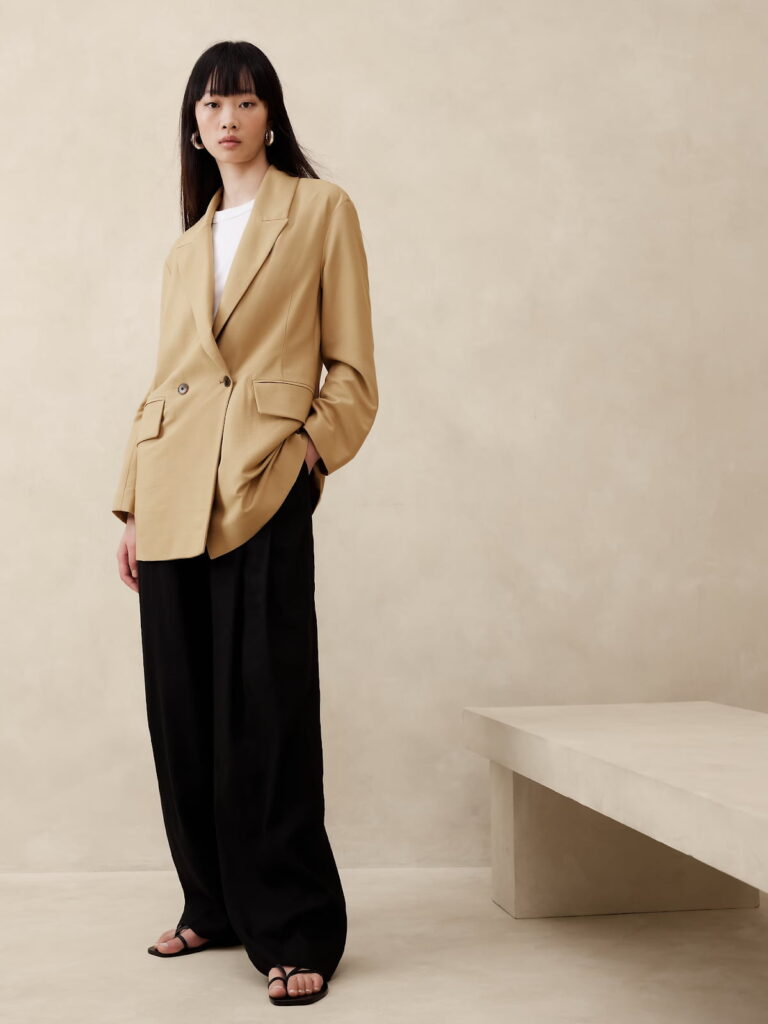
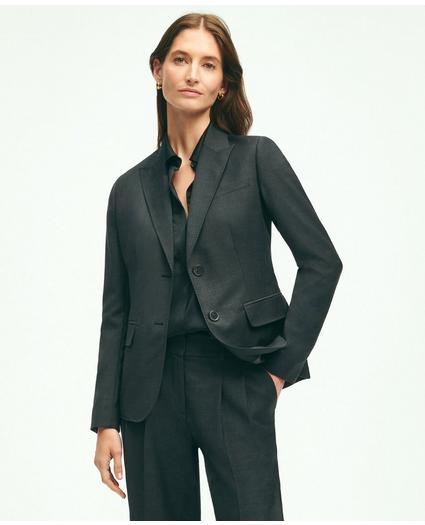
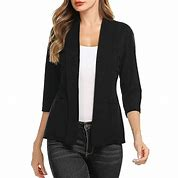
Torso Fit and Button Closure
A well-fitted blazer should hug your torso just right—enough to show off your shape without making you feel like you’re in a straightjacket. A tailored fit gives you that sleek, modern silhouette that’s perfect for work or a night out. If comfort is your top priority, go for a relaxed fit; it gives you a bit more room and is great for layering. When it comes to buttons, a single-button blazer offers a clean, streamlined look, especially if you have a shorter torso. Double-button blazers, on the other hand, add a touch of structure and are perfect for more formal or traditional outfits.
Back Fit and Vent Positioning
The back of your blazer shouldn’t be an afterthought. The fabric should lie smoothly across your back without any weird bunching. A smooth fit looks polished and put-together, while a relaxed fit offers comfort and flexibility—great for those long days when you need your blazer to move with you. Vents play a big role here too. A single vent at the back is a classic choice that allows for easy movement. Double vents, however, offer even more freedom and are particularly flattering if you have curves, as they follow the natural lines of your body.
Collar and Lapel Fit
Finally, let’s talk about collars and lapels. The collar of your blazer should fit snugly against your shirt without any gaps—it’s a small detail, but it makes a big difference in how polished your outfit looks. For the lapels, narrow ones can give you a sleek, modern edge, especially if you have a petite frame. Wide lapels, on the other hand, make a bold statement and are great for larger frames or if you prefer a more traditional style.
Before you commit, check the fit from all angles and consider alterations to achieve that perfect, custom-tailored feel.
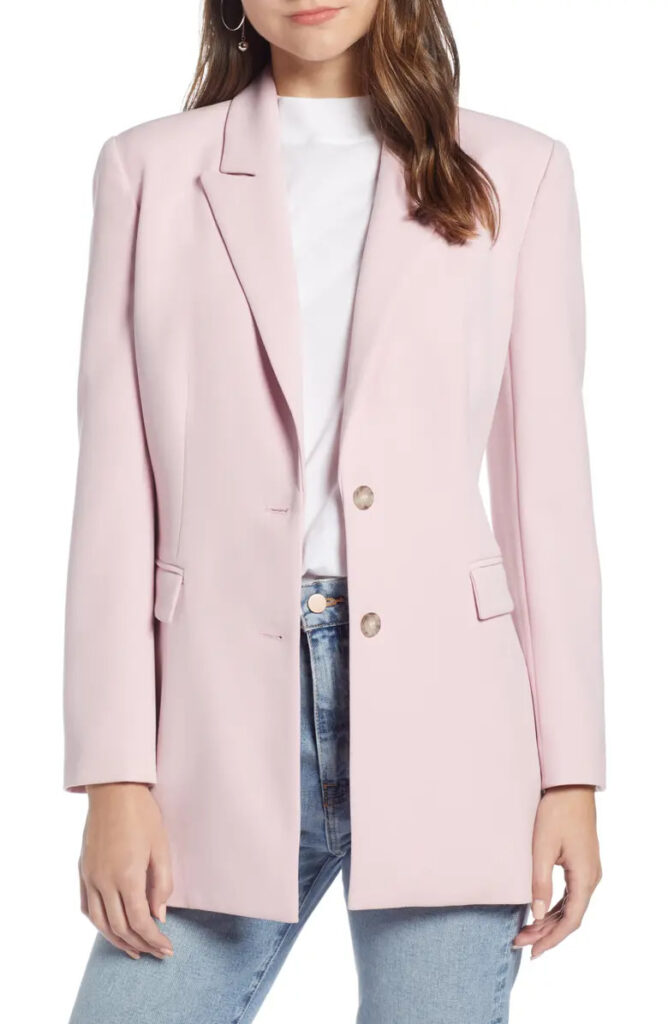
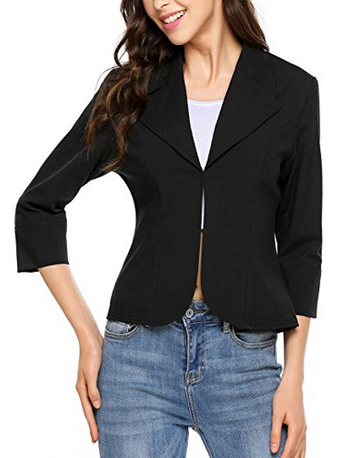
Explore Custom Options for Your Tailored Blazer
When it comes to creating a tailored blazer for women, the options are practically limitless. Every detail, from the pockets to the cuffs and collars, offers a chance to make your blazer truly your own. These custom features don’t just add to the look—they tell a story about your personal style and how you want to present yourself. Let’s dive into how you can craft a blazer that you can get from a tailor in Bangkok look amazing and uniquely yours.
Pockets
Choosing the right pockets can elevate your blazer from just a stylish piece to something incredibly functional.
| Pocket Type | Description | Vibe/Style |
| Patch Pockets | Casual pockets sewn onto the outside of the blazer. | Laid-back, accessible, and chic. |
| Flap Pockets | Traditional pockets with a flap covering the opening. | Polished and traditional. |
| Jetted Pockets | Sleek, minimalist pockets sewn into the fabric with just a slit visible. | Clean, streamlined, and understated elegance. |
Cuffs
Cuffs might seem like a small detail, but they have the power to define the character of your blazer.
| Cuff Detail | Description | Impact/Style |
| Buttons | Choice between classic or bold button styles. | Defines the character of the blazer; classic or bold. |
| Functional Buttonholes (Surgeon’s Cuffs) | Buttonholes that can actually be unbuttoned. | Adds authenticity and practicality to the blazer. |
| Contrasting Fabric Under Cuffs | Different fabric or color under the cuff. | Subtle hint of unique style; adds a personalized touch. |
Collars
The collar is one of the first things people notice about a blazer—it frames your face and sets the tone for the entire look.
| Collar Type | Description | Impact/Style |
| Peaked Lapel | A sharp, upward-pointing lapel that extends towards the shoulders. | Exudes power and formality; ideal for making a strong impression. |
| Notch Lapel | A classic, versatile lapel with a small cut-out or “notch” where the collar meets the lapel. | Works well for both business and casual settings; versatile. |
| Shawl Collar | A smooth, rounded collar with no notches, often used in evening wear. | Adds evening elegance and sophistication. |
| Material Contrasts | Using different materials or colors on the lapel for contrast. | Creates a subtle but impactful style statement; adds uniqueness. |
Tailored Pleats and Seams
The structure of a blazer is all in the details.
| Feature | Description | Impact/Style |
| Pleats | Folded fabric that adds a touch of classic design and enhances mobility. | Combines classic style with functionality; adds ease of movement. |
| Seams and Darts | Carefully placed stitching that flatters the silhouette and enhances the fit. | Creates a custom fit; ensures the blazer flatters your shape. |
Beyond these key elements, you can further customize your blazer with luxurious lining options, buttons that reflect your personal taste—whether understated or bold—and even stitching in colors that add a unique touch to your overall design. Every choice you make contributes to a blazer that isn’t just a piece of clothing, but a cherished part of your wardrobe, perfectly aligned with your personal style.
Conclusion
In conclusion, a tailored women’s blazer that you may have gotten from a Bangkok suit tailor isn’t just another piece of clothing—it’s a true reflection of a woman’s style and confidence. When you choose the right fabric, ensure the perfect fit, and personalize those small details, your blazer becomes more than just what you wear; it becomes a part of who you are. From the material to the cut, and even down to the pockets and cuffs, every element is crafted to blend style with practicality, making a women’s blazer a go-to piece in your wardrobe. Whether you’re dressing up for a formal event or just aiming for a polished look on a casual day, the right tailored women’s blazer will help you stand out, no matter the occasion.
For a women’s blazer that’s uniquely you, contact us and start your custom journey.


